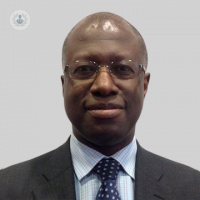Getting ‘the snip’: common questions on vasectomies answered
Written in association with:A vasectomy is a safe and effective form of birth control for men who are very sure they don’t want to father children in the future. But what happens during the procedure and how quickly does it take to work?
In this article, top consultant urologist Professor Francis Chinegwundoh from London, answers some of the most frequently asked questions by men who are considering getting ‘the snip’.

What happens during a vasectomy?
A vasectomy is the surgical procedure to render a man sterile, that is to say, incapable of naturally fathering (more) children.
The vasa are the thin tubes that carry the sperm from the testicles to the prostate, from which they are discharged when the man ejaculates (climaxes).
A vasectomy, which is done on both sides, involves dividing these thin tubes which lie next to the testicles in the scrotum. A bit of each vas is removed - hence the term the ‘snip’. The ends are then tied off to prevent any new sperm getting across the gap.
Is a vasectomy effective immediately?
A man is not sterile immediately afterwards. Sperm already in the tubes, downstream of the snip, still need to be discharged. Men are therefore asked to provide a semen sample four months after a vasectomy to check that there are no more sperm coming through when they ejaculate.
Most of the normal ejaculate is fluid made by the prostate and seminal vesicles, so there is no noticeable reduction in the volume of ejaculate after vasectomy. The more the man ejaculates, the faster the sperm in the tubes will be cleared.
Is a vasectomy 100% effective?
A vasectomy is 99.9% effective. Occassionally, the tubes somehow rejoin and pregnancy results. This is thought to happen to 1 in 2500 vasectomies, however, I have not come across a case in my 24 years as a consultant.
Where is the needle injected?
If the vasectomy is done with the man awake, the local anaesthetic injection is placed into the skin to either side of the testicles. The operation takes around 15-20 minutes.
During the procedure, the man has to stay very still. For this reason, men may opt to have the operation under general anaesthesia.
Does the procedure hurt afterwards?
There may be some mild discomfort afterwards. Men are advised to take paracetamol and avoid strenuous activities for two weeks. It is also a good idea to wear supportive underwear for two weeks.
About 1 in 8 men may experience long term scrotal discomfort afterwards. We believe this is due to the sperm that are still being produced having nowhere to go and building up in the testicles before being broken down.
Is a vasectomy reversible?
A vasectomy can be reversed but the success is by no means guaranteed. It is best for the man to be certain that he does not want any more children before he undergoes the procedure.
If you are interested in undergoing a vasectomy and would like to consult with a highly experienced specialist, visit Professor Francis Chinegwundoh’s Top Doctors profile and book a consultation with him.


